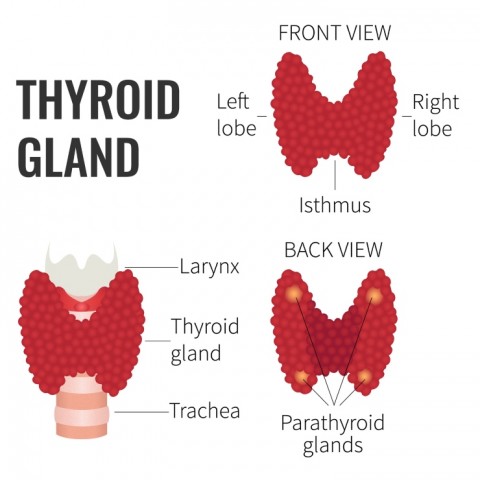DrCarney.com Blog
Do Cruciferous Veggies Impair Thyroid Function?
Cruciferous vegetables are known to be protective against thyroid cancer, as well as against breast, prostate, colorectal, bladder, and lung cancer. This beneficial effect of cruciferous vegetables is due to compounds called glucosinolates which the body metabolizes into isothiocyanates (ITCs). Based on animal studies though, some have theorized that cruciferous vegetables might interfere with thyroid synthesis due to certain breakdown products of glucosinolates. However, these potential effects are only theoretical and are not widely concerning to the medical community. Dr. Joel Fuhrman in his article, Do Cruciferous Vegetables or Soybeans Harm the Thyroid?, states, "The scientific consensus is that cruciferous vegetables could only be detrimental to thyroid function in cases of iodine deficiency or insufficient iodine intake."
Those who follow a Western diet generally meet their iodine requirements from seafood, dairy products and iodized salt. Because seafood and dairy are not included in a plant-based diet and salt is used sparingly, some patients are concerned about the possibility of becoming iodine deficient. Iodine supplementation is an alternate solution, however dark green leafy sea vegetables are a delicious way to ensure sufficient iodine intake. Sea vegetables can be used to season salads or other foods and thus meet our daily requirements. Laver (nori) and alaria seaweed are good choices, along with horsetail tangle, wakame, American wakame, bladderwrack, arme, knotted wrack, and sea palm. Care must be taken not to consume too much, since dark green sea vegetables are a rich source of iodine. The recommended daily intake is 150 micrograms a day with the safe daily upper limit of 1,000 micrograms according to the World Health Organization. For children, it's even less, at 300 micrograms. Kelp (kombu) is extremely high in iodine and should be used in minute amounts. Too much iodine can be harmful just as much as consuming too little. Eating seaweed several times a week will typically ensure adequate intake, although the amount of iodine in seaweed can vary and sometimes provide too much iodine. Consuming excessive amounts of kelp and kelp supplements can lead to iodine toxicity. Click here to see the iodine content in various sea vegetables. It's best to avoid eating the sea vegetable hiziki, since it can absorb toxic elements like arsenic.
Research hasn't found iodine insufficiency to be a common problem even for those eating a plant-based diet. A 2011 study on vegetarians and vegans in the Boston area showed that even though vegans had higher cruciferous intake and lower iodine intake as determined by urinalysis, both groups showed thyroid function within the normal range. And the Adventist Health Study, which analyzed the health of nearly 66,000 Seventh-day Adventists, concluded that "vegan diets which may be expected to lack iodine due to complete exclusion of animal products tended to be protective" against hypothyroid disease.
As Dr. Fuhrman points out, no human study has demonstrated a deficiency in thyroid function due to consuming cruciferous vegetables with the exception of a single, unusual case study. An 88-year-old Chinese woman ate 1-1.5 kilograms of raw bok choy every day for several months in the mistaken belief that it would cure her diabetes. This wildly excessive amount of raw bok choy did finally harm her thyroid function. But a study of subjects eating 150 grams of cooked Brussel sprouts daily for four weeks showed no effects on thyroid function. It's important to mention that although cruciferous vegetables contain natural goitrogenic compounds that could possibly influence thyroid function in those that don't consume enough iodine, it's only a concern when these vegetables are consumed raw in large quantities. An enzyme that releases the goitrogenic compounds is deactivated when it's cooked. Therefore, eating cooked cruciferous vegetables should not pose a risk.
Cruciferous vegetables include arugula, bok choy, broccoli, broccoli rabe, brocollina, Brussels sprouts, cabbage, cauliflower, collard greens, horseradish, kale, kohlrabi, mustard greens, radish, red cabbage, rutabaga, turnips, turnip greens and watercress. These vegetables not only protect against various cancers, but they reduce oxidative stress and help protect against cardiovascular disease when part of an optimal diet. I recommend that my patients adopt a whole-foods plant-based diet with no added oil. In order to thrive with this style of eating, they need to make sure to load up on starchy foods. BUT, greens--like the ones found in the cruciferous family--are vital to health. My mantra is "Beans, Greens, Squash, and Yams." Including a healthy serving of greens in at least two of the three daily meals will rejuvenate our cardiovascular system, allowing blood to flow smoothly to all parts of our bodies that need health and healing.
For additional information, click on the following links:
(1) McDougall Moments - The Thyroid
(2) Thyroid Deficiency Strikes One in Six
(3) Avoiding Iodine Deficiency
(4) Too Much Iodine Can Be as Bad as Too Little
(6) Too Much Iodine Can Be as Bad as Too Little
(7) Iodine Deficiency and Thyroid Function
(8) Arsenic in Kelp Supplements
Joel Fuhrman MD Links
Preview the "Ask the Doc!" Trailer
Your Questions Answered: In Dr. Carney's Starch-Smart® System seminars, written questions from participants are collected beforehand, protecting their privacy. In this informative video presentation, Dr. Carney shares the answer to many of those frequently asked questions - with complex scientific evidence made easy to understand. Learn the answers to what you've always wanted to ask, and so much more!
When you subscribe to the blog, we will send you an e-mail when there are new updates on the site so you wouldn't miss them.




